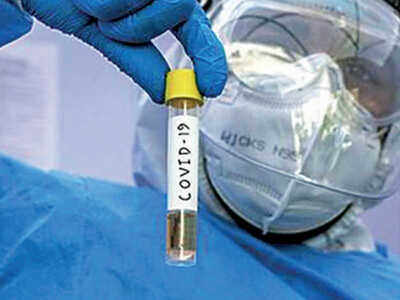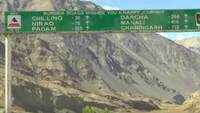
MUMBAI: In a new set of testing guidelines issued on Friday, the Indian Council of Medical Research (ICMR) advised rapid antigen tests as a primary choice for surveillance and screening in containment zones. For non-containment areas and hospital settings, it recommended RTPCR as the preferred test, besides the repurposed TB tests CBNAAT and TrueNat.
The guidelines come at a time when the use of the rapid antigen test, although less accurate than the RT-PCR, has increased in a significant way owing to its shorter turnaround time and ease of use.
The ICMR said that for people with influenza-like illnesses (ILI) or severe acute respiratory infection (SARI) who are seeking immediate admission, the RT-PCR should be the preferred test in hospitals, followed by the rapid antigen test.
It said the rapid antigen test should be the primary choice in containment zones and for screening at points of entry. It advised 100% antigen testing for people living in containment areas of cities with widespread infection.
Hospitals said the idea of using RT-PCR to screen symptomatic people coming to hospitals was not feasible as reports still take 24 hours. An antigen test provides a diagnosis within 30 minutes and allows doctors to take a quick call on whether to admit the patient. Though the ICMR said hospitals could also use CBNAAT and TrueNat as an alternative to RT-PCR, few hospitals have the option.
A municipal official said the ICMR guidelines do clash with the practice on the ground and may be difficult to adhere to. On the ground, most private centres use antigen test combined with a high-resolution CT (HRCT) in symptomatic patients coming to hospitals. An RT-PCR is done only if a symptomatic person tests negative in antigen test. The state, too, said recently that ILI or SARI patients should first do the antigen test.
In BMC hospitals too, the antigen test is done first. “Those who come positive are hospitalised. Those negative are admitted in the suspect ward. If we use RT-PCR, almost all will have to go to the suspect ward,” a doctor said.
A BMC official said the positivity rate between antigen (12%-13%) and RT-PCR (22%) is not too wide in symptomatic patients. Dr Hiren Ambegaonkar, CEO of SL Raheja Hospital, said that while RTPCR remains the gold standard, antigen allows quick decision-making. The cost of the RT-PCR test ranges from Rs 1,900 to Rs 2,500 while the antigen costs about Rs 450.
The guidelines come at a time when the use of the rapid antigen test, although less accurate than the RT-PCR, has increased in a significant way owing to its shorter turnaround time and ease of use.
The ICMR said that for people with influenza-like illnesses (ILI) or severe acute respiratory infection (SARI) who are seeking immediate admission, the RT-PCR should be the preferred test in hospitals, followed by the rapid antigen test.
It said the rapid antigen test should be the primary choice in containment zones and for screening at points of entry. It advised 100% antigen testing for people living in containment areas of cities with widespread infection.
Hospitals said the idea of using RT-PCR to screen symptomatic people coming to hospitals was not feasible as reports still take 24 hours. An antigen test provides a diagnosis within 30 minutes and allows doctors to take a quick call on whether to admit the patient. Though the ICMR said hospitals could also use CBNAAT and TrueNat as an alternative to RT-PCR, few hospitals have the option.
A municipal official said the ICMR guidelines do clash with the practice on the ground and may be difficult to adhere to. On the ground, most private centres use antigen test combined with a high-resolution CT (HRCT) in symptomatic patients coming to hospitals. An RT-PCR is done only if a symptomatic person tests negative in antigen test. The state, too, said recently that ILI or SARI patients should first do the antigen test.
In BMC hospitals too, the antigen test is done first. “Those who come positive are hospitalised. Those negative are admitted in the suspect ward. If we use RT-PCR, almost all will have to go to the suspect ward,” a doctor said.
A BMC official said the positivity rate between antigen (12%-13%) and RT-PCR (22%) is not too wide in symptomatic patients. Dr Hiren Ambegaonkar, CEO of SL Raheja Hospital, said that while RTPCR remains the gold standard, antigen allows quick decision-making. The cost of the RT-PCR test ranges from Rs 1,900 to Rs 2,500 while the antigen costs about Rs 450.

Coronavirus outbreak
Trending Topics
LATEST VIDEOS
City
 SSR death probe: Sushant Singh Rajput’s domestic help Dipesh Sawant arrested by NCB
SSR death probe: Sushant Singh Rajput’s domestic help Dipesh Sawant arrested by NCB  Shocking: Actor Samyuktha Hegde heckled for 'inappropriate' attire amid workout in Bengaluru park
Shocking: Actor Samyuktha Hegde heckled for 'inappropriate' attire amid workout in Bengaluru park  SSR death probe: After Showik Chakraborty’s arrest, NCB to summon Rhea Chakraborty to join investigation
SSR death probe: After Showik Chakraborty’s arrest, NCB to summon Rhea Chakraborty to join investigation  India-China stand-off: BRO's new highway untraceable by enemy, gives 365-day connectivity
India-China stand-off: BRO's new highway untraceable by enemy, gives 365-day connectivity
More from TOI
Navbharat Times
Featured Today in Travel
Get the app




